Editor’s Note: This story was originally published in the Nostalgia Issue of Life & Thyme.
——
The Bridge
You would think after 53 years of being a chef, building a personal brand and culinary empire, and changing the shape of cuisine and cooking altogether, you would be content.
Not Wolfgang Puck.
“Nobody likes change, and I love change,” he tells me in the bar of his eponymously named restaurant at Hotel Bel-Air. The lounge’s walls are lined in black-and-white portraits of musicians like Ray Charles and Mick Jagger—an aesthetic juxtaposed with the restaurant’s California-inspired dining-room-in-a-courtyard, with white linen lining tables precisely plated and vines hiding your nook from the sun shining above.
That morning, I drove up Stone Canyon Road and walked across a bridge poised over a swan-filled pond to the entrance of the iconic dusty-pink-walled hotel, and found myself at Wolfgang Puck at Hotel Bel-Air’s maître d’ station.
Puck and I take a seat at a table amidst hospitality staff in pressed aprons buzzing about. A model, the daughter of a famous Western actor, is seated behind us—not an uncommon sight for a Puck establishment. Dining at this restaurant in the midst of Bel-Air—the neighborhood with the highest annual median income of any city in all of Los Angeles County—is simple elegance, not to mention a symbol of status.

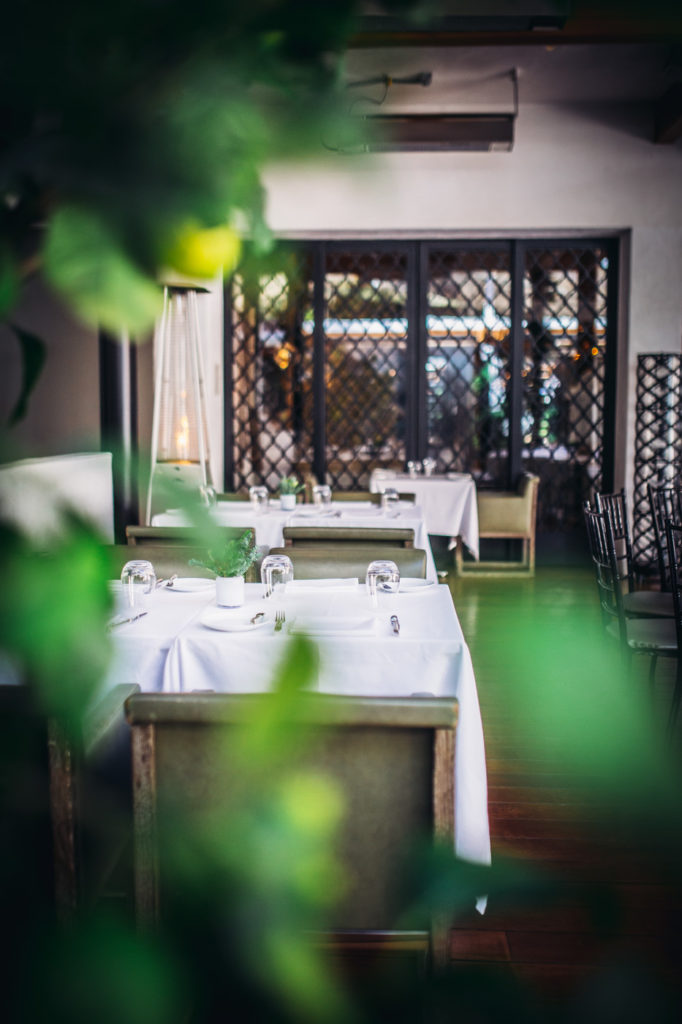

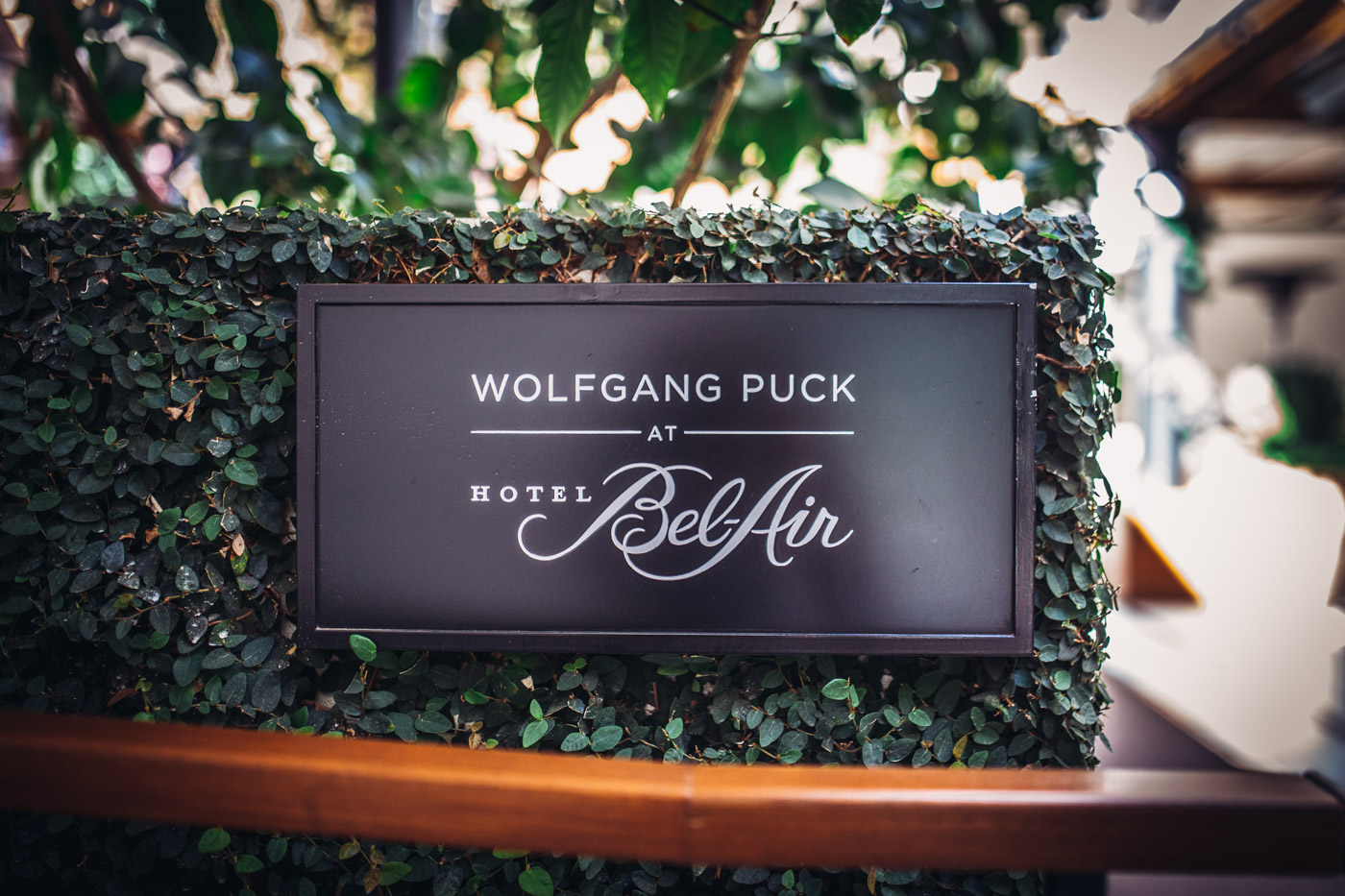
Once someone gains a certain amount of notoriety—it doesn’t get much more renowned than Puck—you don’t think of where they came from; in a way, this is taken for granted. They become the stuff of legend, rather than truth. “Once you get well-known, that’s where people think you started,” Puck says to me.
But what of their failures? You don’t think of someone like Wolfgang Puck applying for jobs, being rejected, and failing at what they’re now very successful at. If Puck didn’t have the drive to constantly strive for more—to always keep moving forward—his trajectory could have been very different; and thus, food culture as we know it could have followed a different course.
You don’t think of someone as famous as Puck plucking radishes from the earth on a small farm in the Austrian countryside after World War II. But that’s where he came from.
Born Wolfgang Johannes Topfschnig, Puck lived in the small town of Sankt Veit an der Glan on the border of Southern Austria and Northern Italy where his mother was a cook, and they had a garden where they would pick vegetables to prepare meals for themselves. It was simple, organic food—due to necessity. Of course, in the wintertime, their options were more limited, so meals consisted heavily of rice, potatoes and noodles. “When [my mother] cooked at home we didn’t have a lot of money, so we had meat once a week and ate a lot of noodles,” says Puck.
“We did not feel deprived. We had our own chickens—our own eggs. We bought a small pig and fed it all the leftover food we had,” Puck explains. They had a self-sustaining model of eating.
“When people talk these days about ‘farm-to-table,’ for us, it was totally that,” he tells me. “And the funny thing was, I always thought something store-bought was much better. For me, a can of pineapple was a luxury item. Not our apples or plums.”
“We went into the forest and picked blueberries and raspberries and wild strawberries. Everything was in the countryside. I grew up in an environment like that, where the food tasted very good, but it was very simple,” he says.
While this seems idyllic, life at home was anything but. As a boy maturing into a young man, Puck had a tumultuous relationship with his stepfather, and he wanted an out. “I wasn’t really happy because my stepfather was really crazy,” he tells me. So he thought he’d pursue architecture, which was inspired when he first saw a photograph of the Empire State Building—the world’s tallest building standing in the midst of New York City.
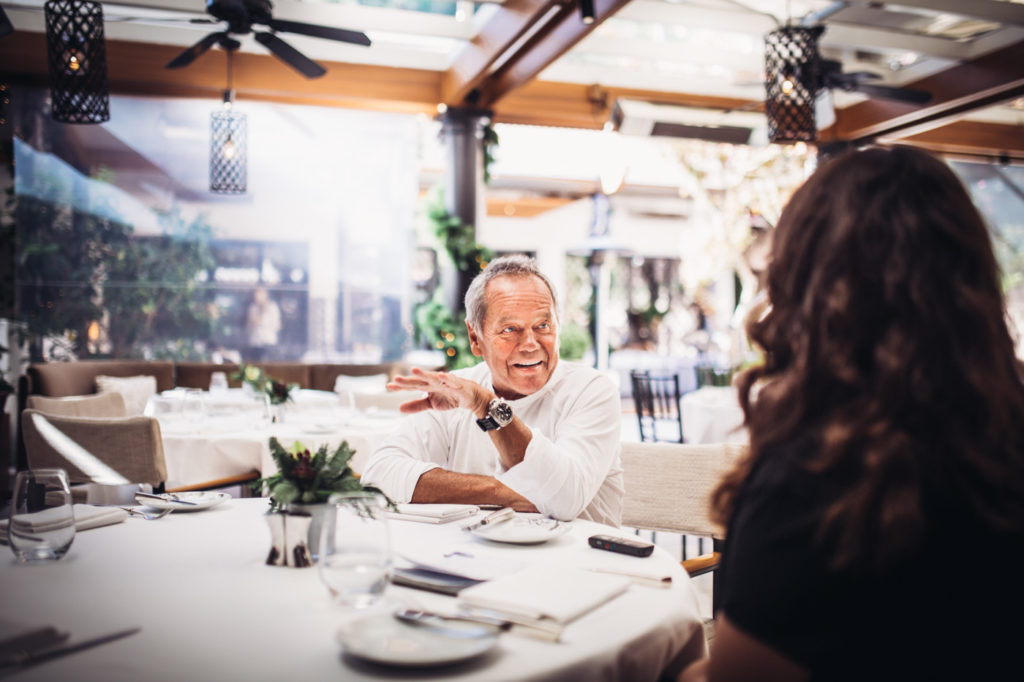
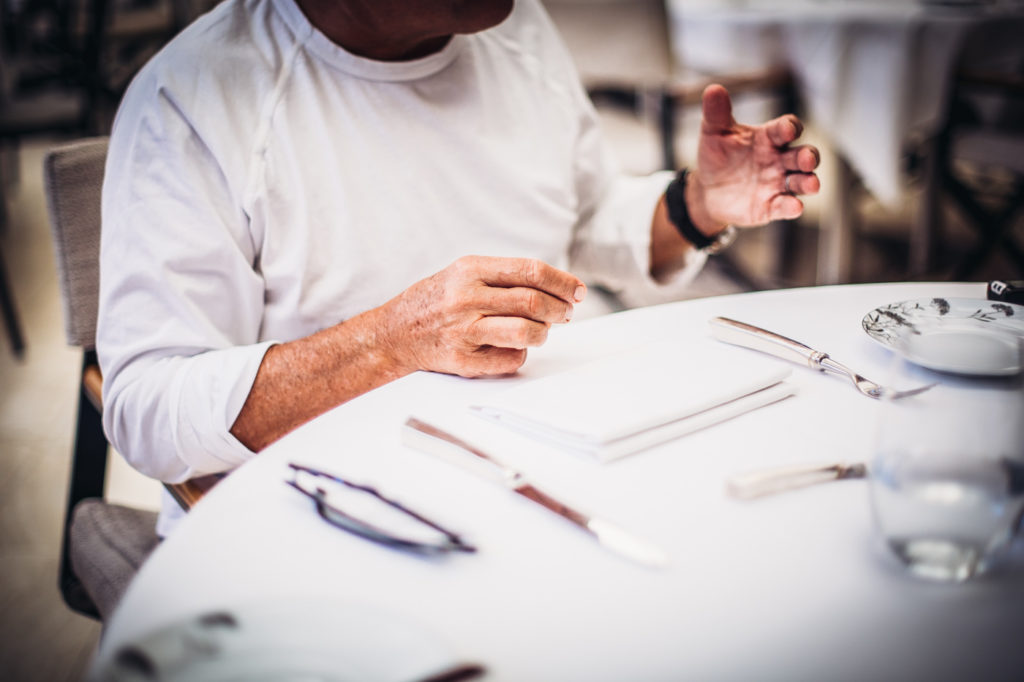
“I wanted to build one in my little village,” he says of the skyscraper, with a smile on his face. “Then I found out to go to school I’d have to go to Vienna, and we didn’t have the money for that.” At the time, he would help his mother with cooking during the summer at the hotel where she worked. He would also assist the pastry chef at the hotel, so he thought he would become one too. All he knew was he had to get out of the house.
However, when he searched for a job, no one would hire him. “I remember one place I walked in—there was the pastry shop upstairs and downstairs in the cellar was the kitchen—and I walked downstairs and they had something cooling on the floor on sheet pans,” Puck recalls. “I was nervous, obviously.” He was told to go downstairs to inquire with the chef. “I walked down and I walked through the cake on the floor there. They were all frozen looking at me,” he laughs thinking about this memory, still fresh in his mind. Needless to say, he wasn’t hired for the job.
But the owner of the hotel where his mother was employed was able to acquire an apprenticeship in a town nearby. “I was happy to be out of the house because my stepfather was impossible and mean to me and my mother,” Puck tells me, shaking his head. “I wanted to leave.” While he’s years away from this time in his life, speaking of it still evokes a reaction for him in the trellised courtyard. I see the Wolfgang Puck sitting before me, but this man became who he is because he had to get away. He had to build something of himself; and he had to prove himself.
He accepted the position, and moved away from home at the age of 14. Although the town was a short distance from where he grew up, he felt completely extricated. The train into town took an hour and a half; and from the station he had to walk another 90 minutes to his house.
Here he was faced with an unexpected challenge: the chef. “The chef there was almost the same as my stepfather,” he says. “He was drunk a lot too.” He recalls a time a month into his apprenticeship during Sunday lunch, the busiest time of the week. His duty was to peel potatoes, and they ran out. “That was my main job,” he says. “So it was all my fault.” And at the end of that service, the chef fired Puck.
“Just like my stepfather always told me I’m good for nothing, the chef said, ‘You’re not good enough. You can’t work here,’” he says. Puck entered a depression, wondering what he was going to do. All he knew was, he couldn’t go back home. He tells me, “I thought, ‘I’m just going to kill myself.’”
He went to a bridge that crossed a river in town. “I was standing there at night on the bridge and thought, ‘I’m going to jump from this bridge into the water,’” he says. “I was standing and standing there for maybe an hour with all the things going through my head.”
Then he was struck with a thought: “I’m just going to go back tomorrow and see what happens.” So he rented a bedroom from an elderly woman who had a three-bedroom apartment in town, and he went back to work the next day.
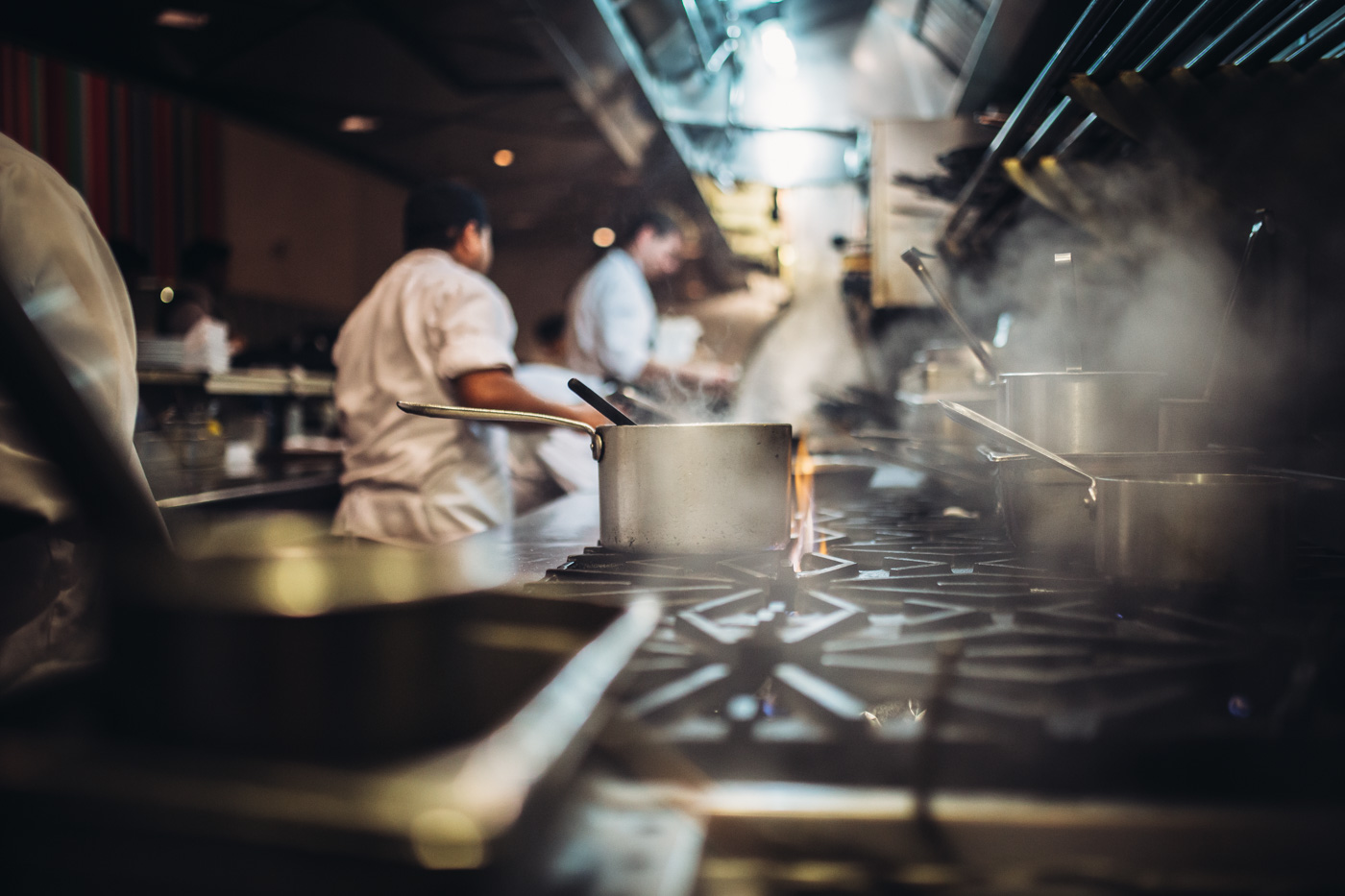
“I couldn’t sleep the whole night. I got up and went to the restaurant early, and the apprentice who was a year ahead of me was happy to see me again because he would have to peel the potatoes again [if I hadn’t come back],” he laughs. To his surprise, the apprentice hid Puck in the vegetable cellar and left him there to do his work. He didn’t know how he was going to get paid, even though he was already being paid very little. “But that wasn’t the main thing,” he says.
Puck went unnoticed like this for nearly 10 days. But finally the chef walked into the vegetable cellar. He had no idea that Puck had returned to work after he was fired.
“He told me to go home to my mother,” Puck says, recalling insults the chef expelled at him. “And I said, ‘I cannot go home. I’m going to kill myself instead.’”
The chef called the owner of the hotel, exasperated with this kid, Wolfgang. The hotel’s owner suggested sending Puck to another location since he was clearly not going to take no for an answer. One of the main chefs at this hotel was a woman with a child Puck’s age. “She was much nicer,” he tells me. “She said, ‘Just do your job. Don’t talk; just listen. Get out of the way and we’ll be fine.’”
After about a year into his apprenticeship, Puck left to attend a cooking-à-la-boarding-school for three months where he learned cooking techniques, and also took courses like accounting. At the end of the term, Puck had received straight A’s, and he had to show his report card to the hotel’s owner. “I went and he looked at it. He never saw all A’s,” he laughs, mimicking holding a piece of paper in his hands, looking at it with incredulous disbelief.
“He was so happy. He said, ‘I’m so proud of you,’” Puck says, smiling. “I was scared because he kept looking and looking at it because I was supposed to be the good-for-nothing.” From then on, each time the owner walked through the kitchen, he would say hello to the chef, and then ask for Puck’s whereabouts. Things were beginning to look up for Puck.
After three years of working in this kitchen, a restaurant from France had come to host a gastronomic week of their menu. “They’d cook with wine and make boeuf bourguignon and coq au vin. They’d use bottles of wine to cook meat in it,” he says. “And I wanted to go and learn.”
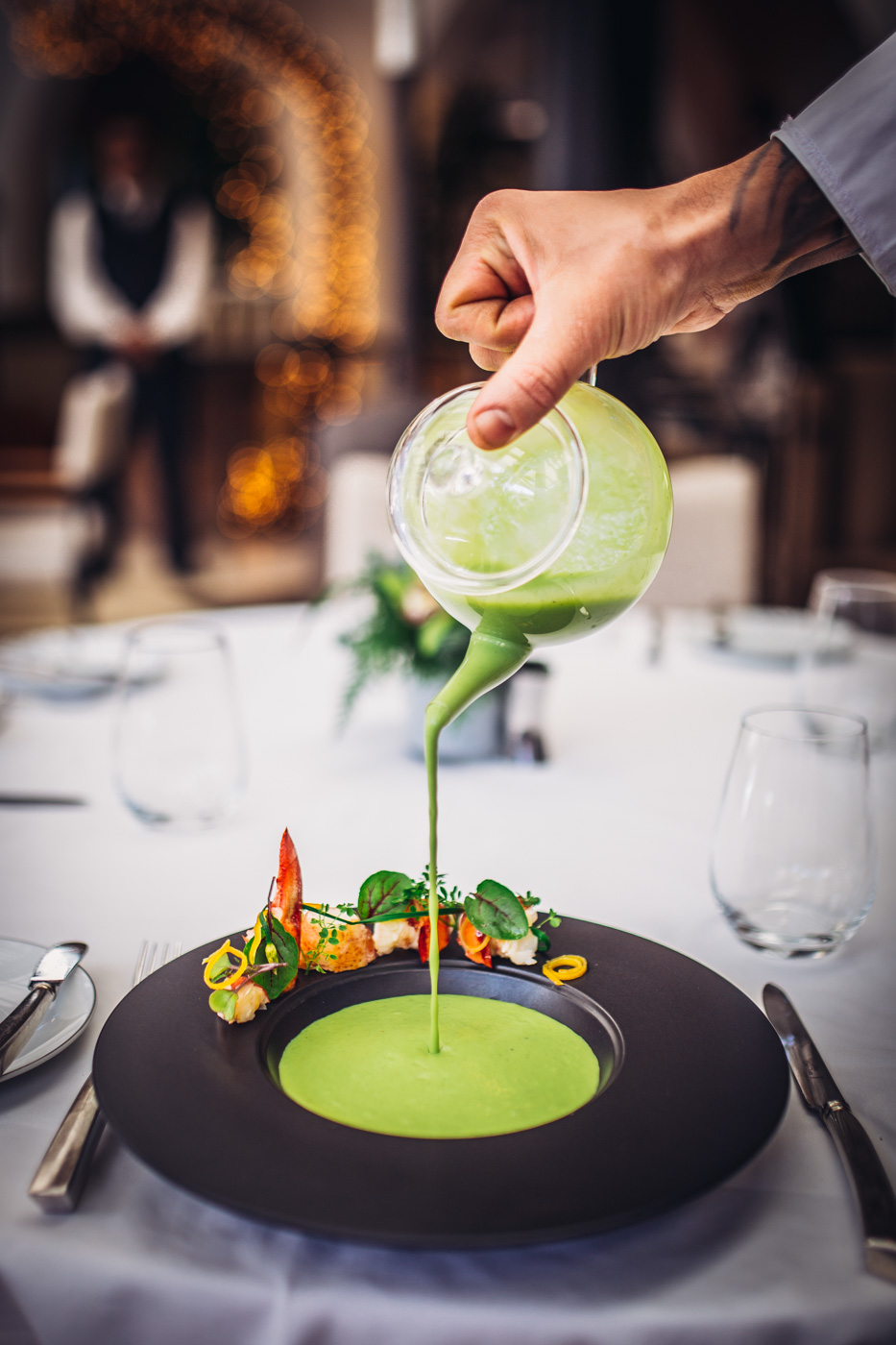
This introduction to French cooking was the most complex gastronomy Puck had worked on thus far. He was so intrigued that he wrote a letter to a restaurant in Dijon to inquire about getting a job in the kitchen. He was accepted, and he moved to France at the age of 17.
“About a year later, the Michelin Guide came out,” says Puck. Although he didn’t know what it was at the time, he knew it was important because the owner had thrown a cocktail party for the employees to celebrate receiving a star. He was preparing to move home in a few months. He had a girlfriend and was thinking of marrying her, and was considering working at her father’s hotel on a lake. But he took the guide and flipped through its pages, seeing restaurants with two and three stars, and he knew he couldn’t return home. Once again, Puck wrote letters, this time to every restaurant in the guide.
The Soup
L’Oustau de Baumanière was the first to respond to Puck’s letters, in which he proposed if the chefs saw Puck working well, they could pay him, and if they didn’t, they didn’t need to; he just wanted the opportunity. But three months into his apprenticeship he hadn’t received any money.
He told Raymond Thuilier—the man who was formative in Puck entering the world of the stars, both Michelin and movie—that he would have to leave. “At the time, I was working next to him at the sauce station. He used to love to makes the sauces, and I wasn’t afraid of him,” he says. When Thuilier asked other chefs to taste what he made, they always responded positively. “When I used to make something and he’d taste it, he’d say, ‘Put a little salt or a little pepper in it.’ When he made something, I did the same thing to him,” He laughs recalling this. Rather than coax the owner’s ego, he told him the truth. Thuilier liked the tenacious 18-year-old. “He thought, ‘He’s really thinks. He’s not somebody who just says yes,’” Puck remembers.
“When I was 20 they had another restaurant with one star. I became the chef there for a year,” he says. But he worked with a staff that was older than he was, so there was resistance; nobody wanted to listen to him. He eventually ended up in Beaulieu in the South of France, but didn’t have a working permit, so he was told he had to leave the country in a week’s time, which is when he found a job in Monte Carlo. “I started to work at Hotel de Paris and I didn’t really like it because it was this big hotel kitchen,” he says. He was only a commis, where he was on the vegetable station yet again. “The chef on the vegetable station was 60 years old. They had all these employees who were there forever, and mean,” he says. He felt like he was backsliding—and his food was being tampered with; someone wanted to make sure he didn’t succeed.
“One time I had to make a soup; every vegetable had to be cut in triangles. I made it and thought it was good. And after lunch was had to bring it to the chef on a plate like this,” he says, picking up a white plate sitting on the table in front of him and holding it out to me flat on his hands. “He tasted it and got red in his face and said, ‘What are you giving me?’” Confused, Puck tasted a spoonful. One of the cooks had put a pound of salt into his soup.
Puck quit and contacted Thuilier, who connected him with Maxim’s in Paris. After about a year and a half he became chef de partie, and by his last six months he was the night chef responsible for the kitchen from 11 p.m. to 2 a.m., which is the time all the important customers came in for dinner after the opera. He was 24 years old, and he was the chef of a three-star restaurant.
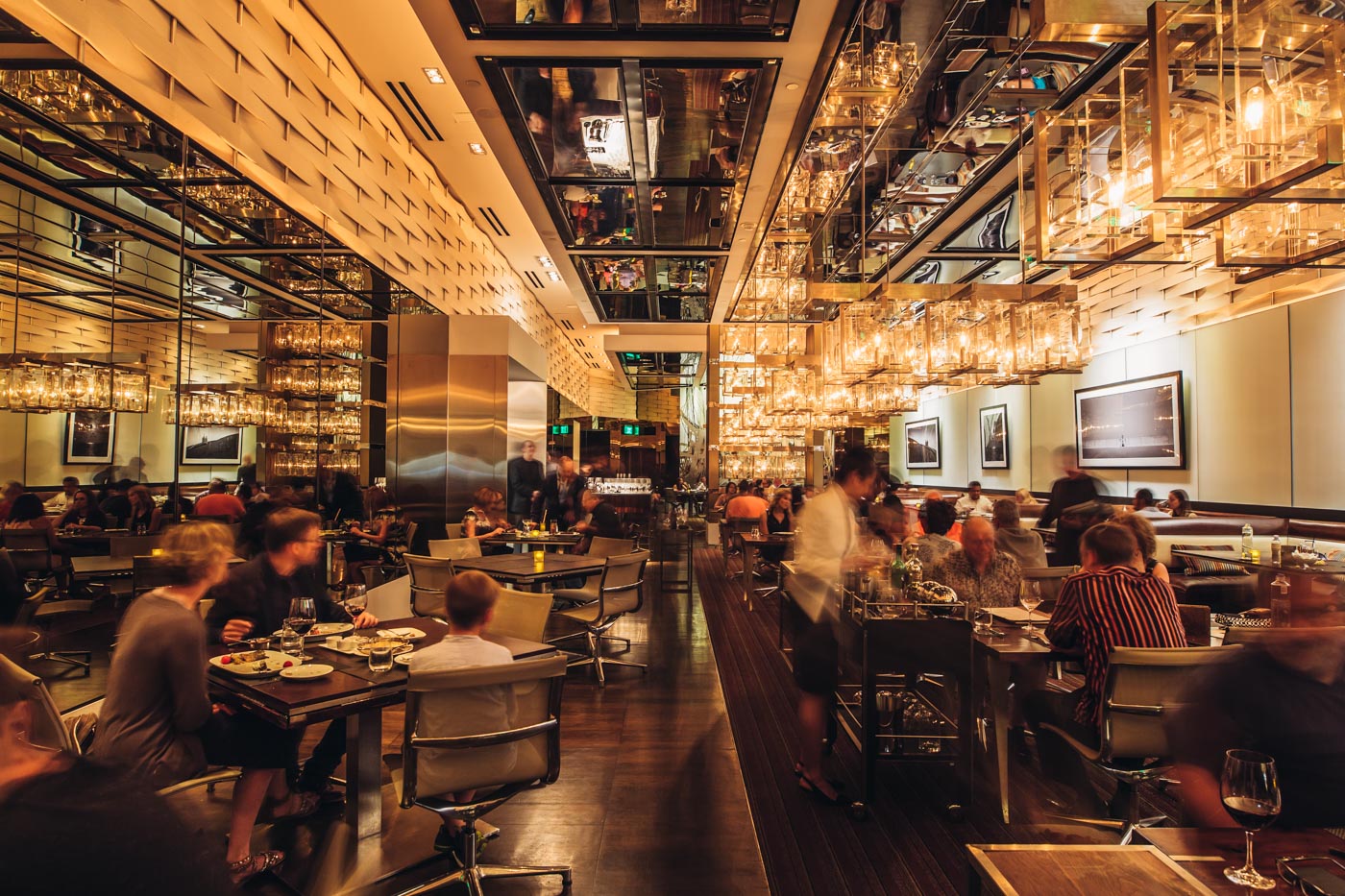
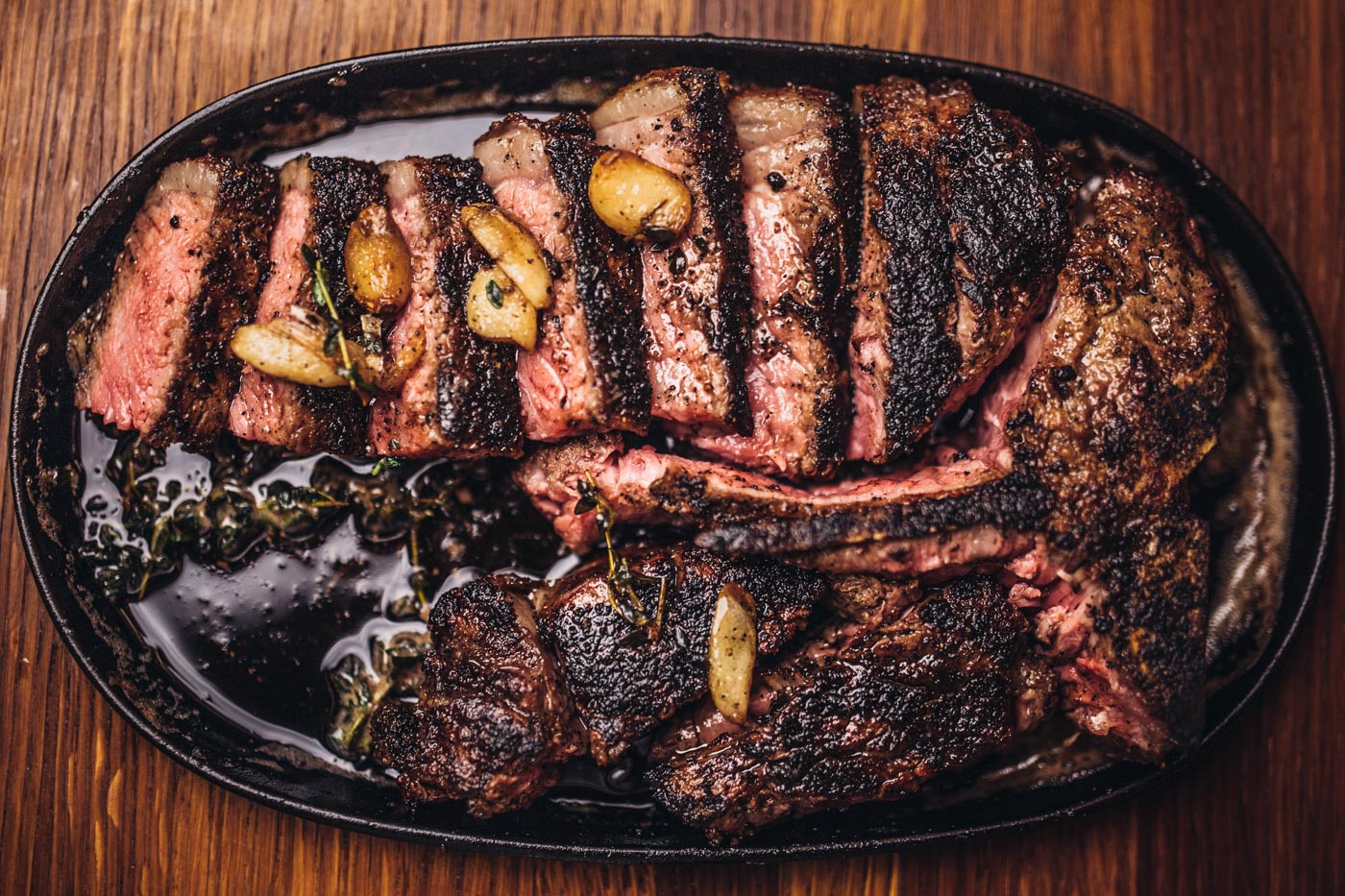
The States
Puck had always dreamt about coming to America. “I always thought in America everybody’s rich. They all drive these big cars,” he laughs.
Through a connection, Puck was hired as a chef at a bistro in New York. This was Puck’s chance to move across the Atlantic. Although the ambiance at the bistro was vibrant and exclusive, there were constant complaints about the food. So he sought out other opportunities and landed at La Tour in Indianapolis.
“I was a big fan of auto-racing, so I said, “Indianapolis? Sounds great!’” laughs Puck, knowing what he knows now. He thought it would be like the rally auto-racing in Monaco—not quite. But once again, Puck was out of money and staying in a cheap hotel in New York, and it was time to move on, so he hopped on a Greyhound bus. “The restaurant was a very elegant French restaurant—very upscale,” he says. A year into the job, he was finally able to buy his first big car—a Cadillac. And a year later he got his green card. He laughs, “Nobody really immigrates to Indiana. I was the only person there.”
“After that, the same company had a restaurant [in Los Angeles], and they lost their contract in Indianapolis,” he says. “I wanted to go to San Francisco, but they didn’t have an opening.” So he moved to California. He asked the executive chef—who was making around $320 a week—if he could be paid $300 per week. He looked at Puck like he was “a golden boy,” as he calls it. “He was a Scandinavian guy who was terrible as a cook. He was more like a general walking around. So he didn’t really like me much,” he says. “I remember one time we did one of these gourmet society dinners, and he said he was going to do the appetizers. They wrote back a letter saying everything was delicious except the appetizers.”
“Then the chef left, and the manager—he was a German guy who was basically the same—changed the menu, and I got so fed up because they didn’t ask me,” he says. He was getting frustrated with proving himself. He wanted to create dishes for a menu. “So I told the manager, ‘Here’s my apron. If you know how to write the menu, you should cook it too. I’m leaving.’” He already had a job lined up at the notorious Ma Maison.
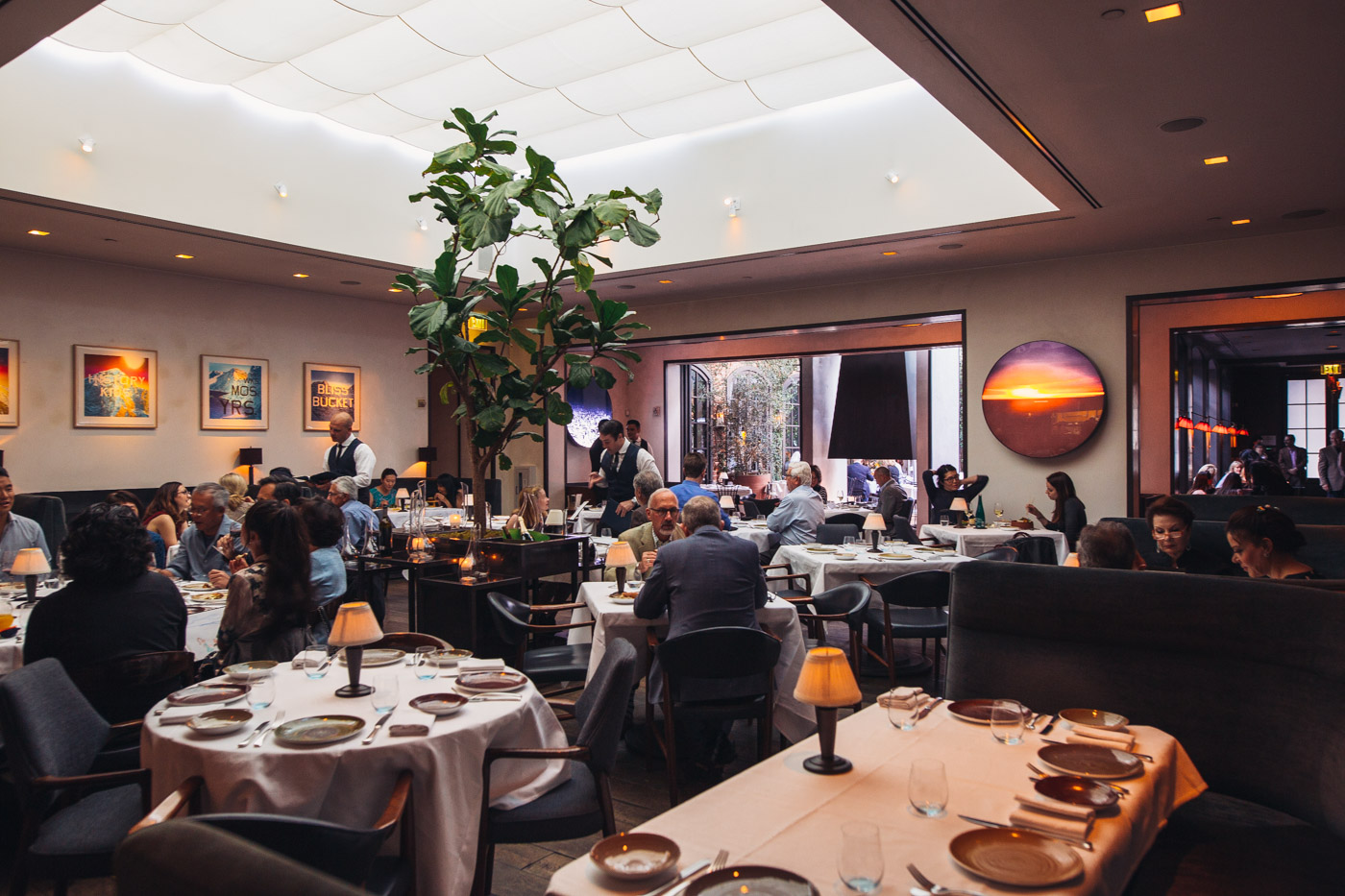
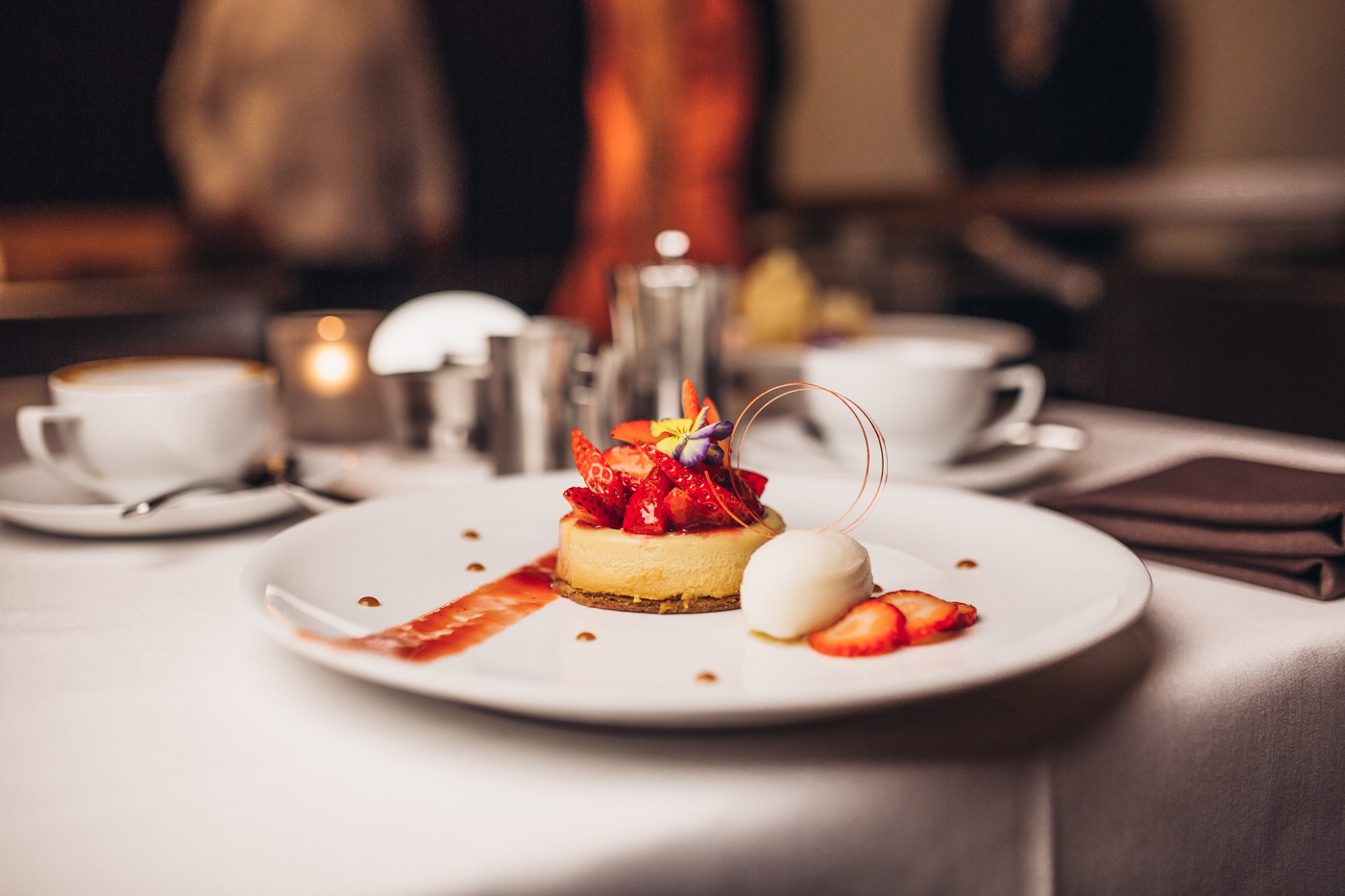
The Fame
Puck started working at the famed West Hollywood restaurant—the job that put him on the map—in the summer of 1975. “I didn’t know Ma Maison was in that bad of shape. My first paycheck bounced and the food was terrible,” he says. “Little by little the restaurant moved up, but I always thought, ‘I want to be my own boss one day.’” So he told the owner, Patrick Terrail, of his ambitions. He said to him, “I don’t care if it has 20 seats. I don’t want to have somebody else telling me what to do.”
Puck became part-owner of Ma Maison and gained celebrity when he changed the face of food by pioneering California nouvelle cuisine. Ultimately, Puck left in 1981 and opened his flagship restaurant, Spago, in 1982 on the Sunset Strip along with Barbara Lazaroff. Over 30 years later and offering a new menu, Spago now sits on Canon Drive in Beverly Hills. “By changing, it gave us a new life. And now, business at Spago has never been better,” he says. “I think it just validates it. If you don’t change, little by little you fall behind.”
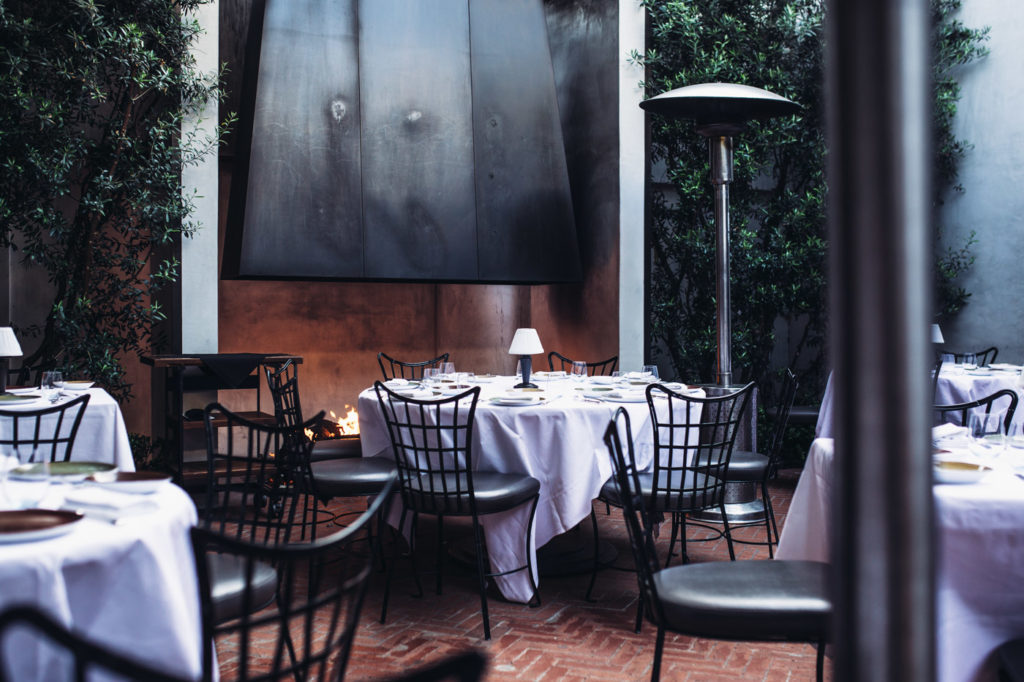
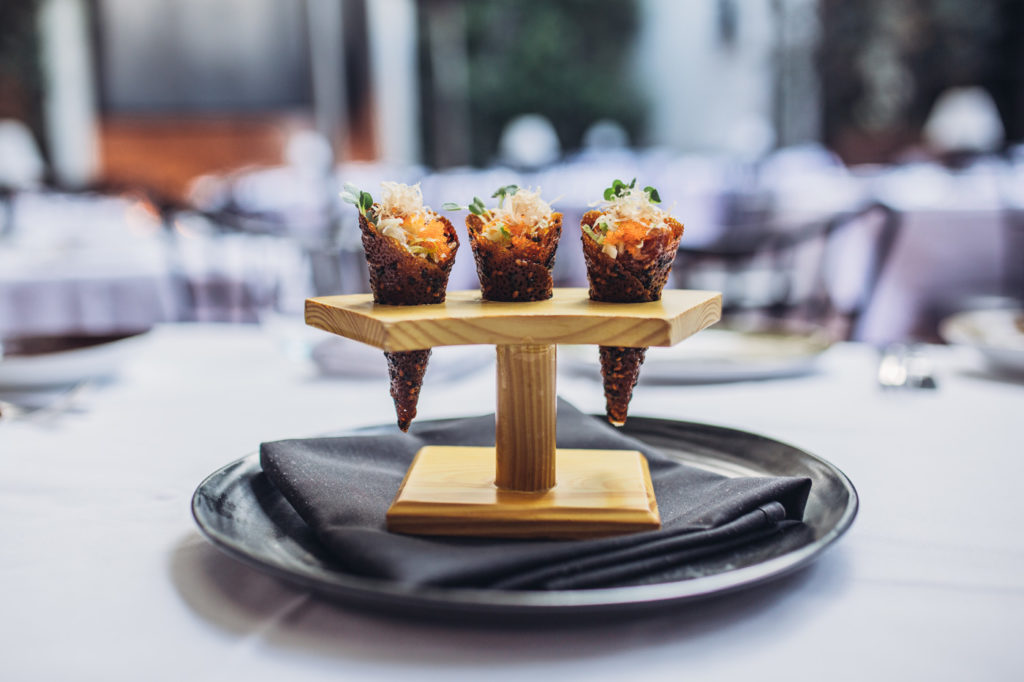
Puck was well on his way to becoming the empiric success he is today—a celebrity chef with three enterprises (Wolfgang Puck Fine Dining Group, Wolfgang Puck Catering, and Wolfgang Puck Worldwide, Inc.), countless James Beard Awards and Michelin stars under his belt, appearances on reality cooking shows, the success of Modern French Cooking for the American Kitchen, and an induction into the Culinary Hall of Fame. He had just begun to build his brand, and with all the trials of the kitchen he had experienced since leaving home at age 14, all of the conflict with chefs and cooks and money and visas, he knew how he didn’t want to run a kitchen.
Being the owner, manager and chef of Spago, he knew he wanted to have everything out in the open—including the kitchen. “At that time, nobody had an open kitchen in the dining room, and people loved it,” he says. His mantra was, “Nothing should be serious except the food.”
Following the success of his menu at Ma Maison, Puck maintained his philosophy that ingredients should be fresh, local and organic, which was not easily accessible at the time. “There was no farmers’ market here or anywhere else, so I went to the Chino Farm in Rancho Santa Fe and picked up vegetables,” he says; or he’d have a farmer from Oxnard deliver him produce. Puck was setting a precedent, and even if it wasn’t convenient, he wouldn’t settle for less then, and he won’t now.
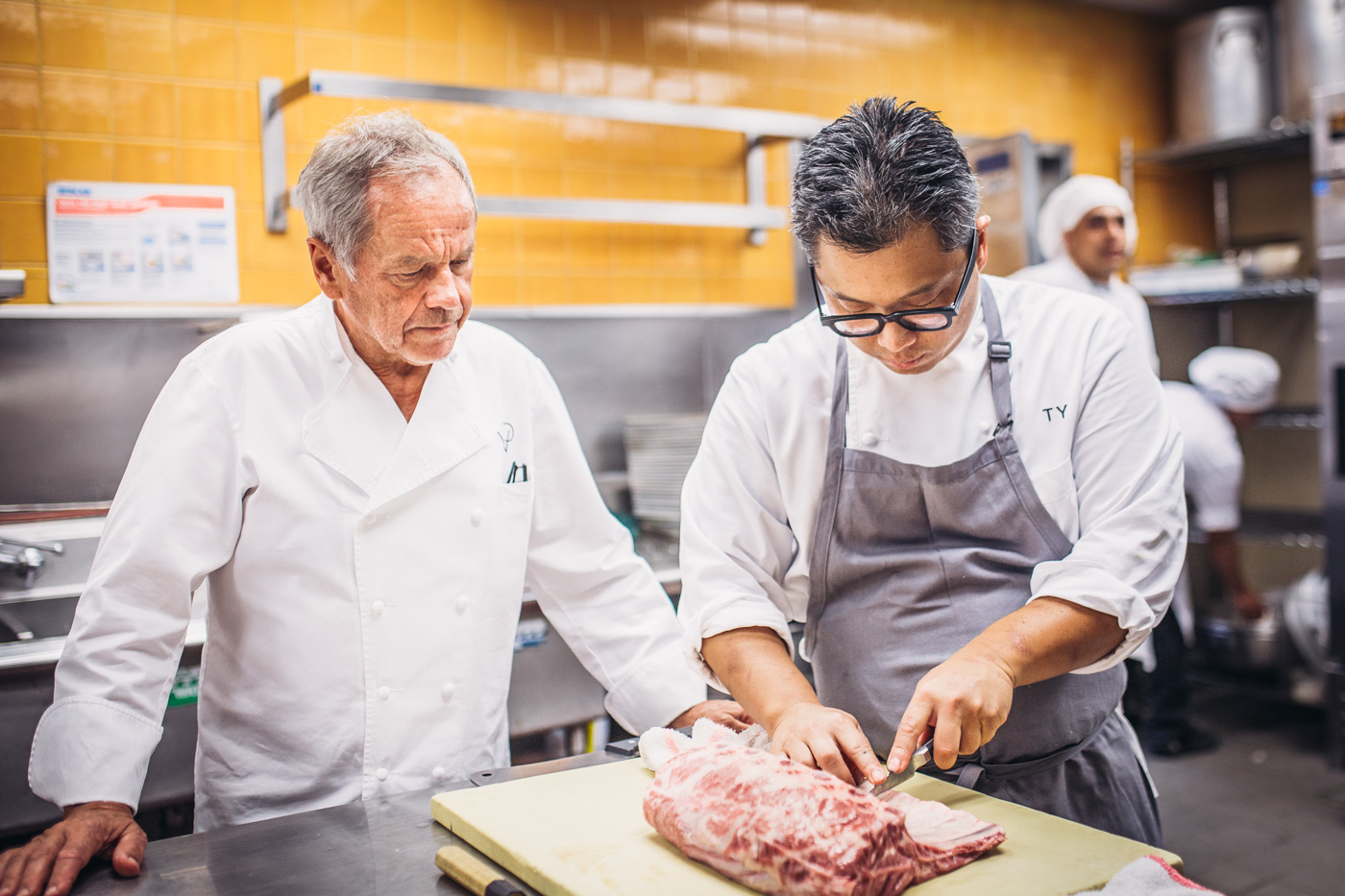
Celebrities likes Elizabeth Taylor, Michael Jackson and Madonna could be found dining on any given night at Spago. Even today, Anthony Hopkins momentarily joins our conversation to pay his respects. But owning one (very) successful restaurant wasn’t enough. “I’m always curious. And I’m always passionate about food,” he says. He opened Spago in Tokyo a year later, and after that, he decided to open a Chinese restaurant. “I never cooked Chinese food in my life before that,” he says with a smile. So in 1983, he opened Chinois—the first fusion restaurant—in Santa Monica. He was providing a new interpretation of an old classic; he was looking at food with a new pair of eyes.
“I think you have to have some comfort, but also innovation,” he says, describing his restaurants, and—perhaps unintentionally—his ethos. “It’s an important part to also move forward.”
“It was an interesting experience to go from one side totally to the other. It became very, very successful—and we’re still open,” Puck says of Chinois. “There are very few restaurants that can stay the test of time.”
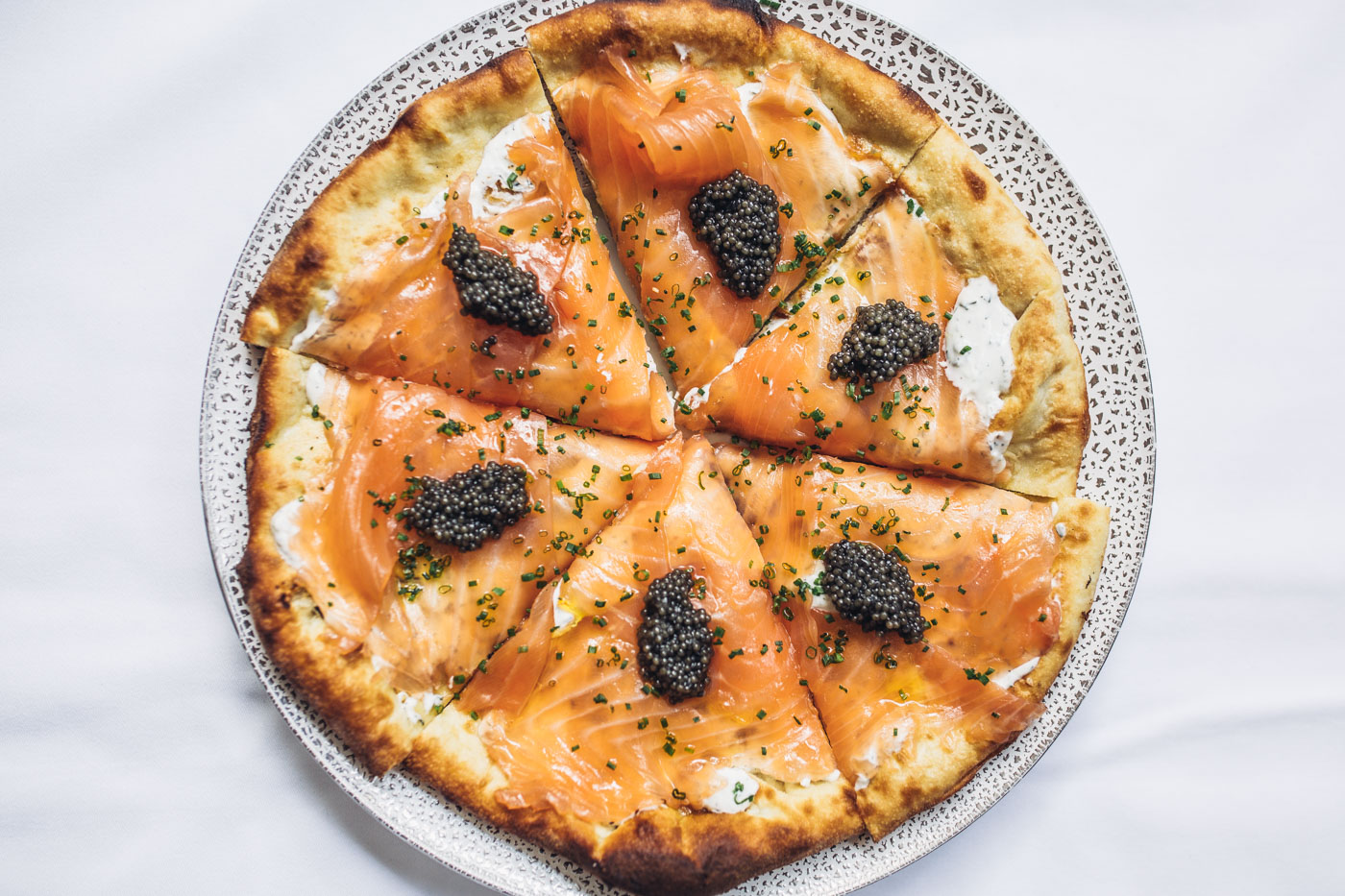
The Pizza
In 1989 he started to open more restaurants, the first being Postrio in San Francisco. Then came Eureka, which was both a restaurant and brewery. It failed within two years. “We were supposed to sell a million cases of beer, and we only sold 300,000,” he tells me. “I learned I can’t do something I don’t know.”
Since then, Puck has opened restaurants around the world and has had an Emmy Award-winning show on Food Network. And he’s carried over his ethos to Wolfgang Puck Express, as well as cook-at-home meals when he started selling frozen pizzas in the late 1980s. Not wanting to be hypocritical, he wondered how he can enter the frozen food business when he says everything has to be fresh.
The story of Puck’s pizza was spurred on by one late-night television host. “Johnny Carson used to be a regular at the restaurant. On Friday night, he used to take home eight or 10 pizzas,” he tells me. Wondering what Carson did with them, he discovered he would put them in the freezer to reheat for later dining. Puck couldn’t believe it, but he thought to himself, “Well, if Johnny can eat them frozen, other people can too.” Gelson’s approached him with the prospect of selling these pizzas through their supermarkets, so Puck tried a few different variations to find the best way to cook them—he would have them cooked halfway, and then you cooked them the rest of the way at home. Grate a little parmesan, drizzle a little oil, place a few basil leaves on top and voila!
Next on Puck’s plate was moving into offering his food conveniently in supermarkets and airports. Wolfgang Puck Express offers healthy food like a chicken salad sandwich for a caesar salad, for those still interested in finding quality on-the-go options. “Not everybody is going to eat at one of our restaurants every day. Sometimes they’re going to eat at home. Sometimes they’re going to eat in the car. Sometimes they’re hungry at the airport,” he says. By offering options at different price points, he makes quality cuisine available to everyone. “As long as it’s good for wherever we are, it has to be the best,” he says. “No matter at what level we play, we try to be the best one in the category.”
No matter what he is cooking, or where you get his food, Puck wants what you consume to be fresh. “I still love to go to the farmers’ market,” he says. “I really think that’s where it starts. Cooking is simple if you have great ingredients. You add a few accents to enhance it, and that’s it.” I think of him as a young boy in Austria cooking alongside mother, preparing a simple meal from the vegetables they picked in their garden. “I tell everybody, use five or six ingredients. Take out something,” he says. “It’s like editing.” The natural flavors of the ingredients should organically complement one another. Puck refines the process to its simplest form to create truly “refined” dining.
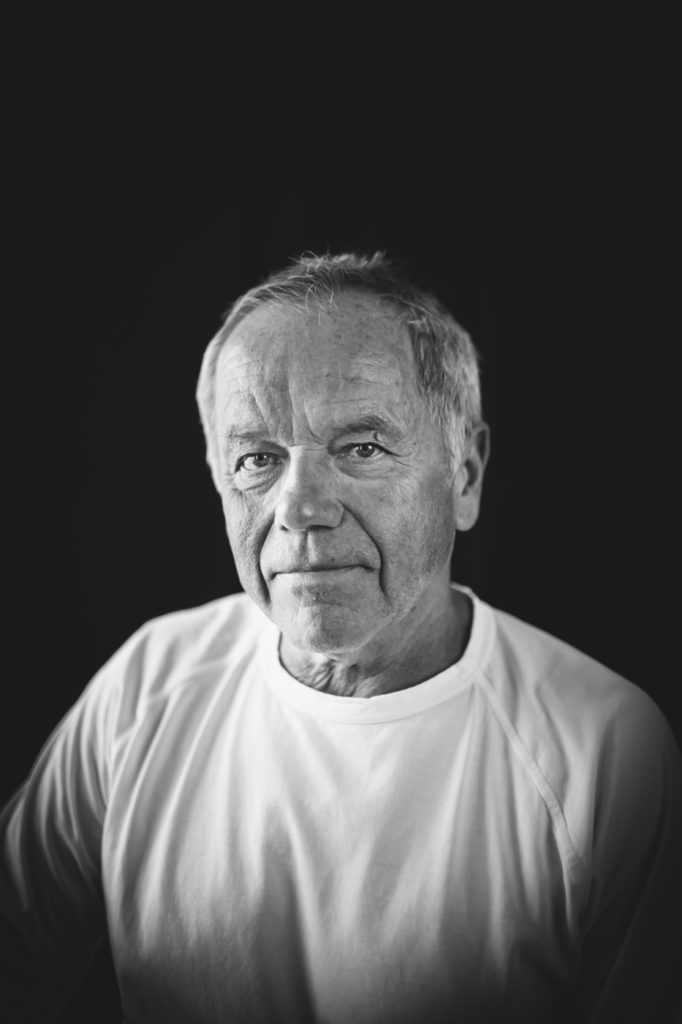
The Teacher
On a recent flight back from Maui, Puck’s wife said to him, “At your age, you really should learn how to slow down and just enjoy life.” He said, “The problem with me is I love what I do. I love all these different aspects of it. So it’s not like going to work.” He is still constantly searching for new avenues to explore and new techniques to try. “In my head it’s always, ‘How can we do it better?’” he says to me.
We head into the kitchen at Hotel Bel-Air. Puck excitedly tells me of a technique they use to char chicken using an open flame. “Look at this,” he says as the chicken roasts. Even today, he is excited to be here, at work. He feeds off the energy of others and clearly still has passion for what he does, down to something as simple as roasting a chicken, like he still has something to prove.
At his core, Wolfgang Puck is still the boy picking vegetables from the earth in the Austrian countryside, striving for more, thriving on the challenge. Although he’s no longer the boy peeling potatoes in a hotel kitchen, learning the craft of the trade that chose him. With one foot always moving forward, he’s now showing everyone else how to eat.
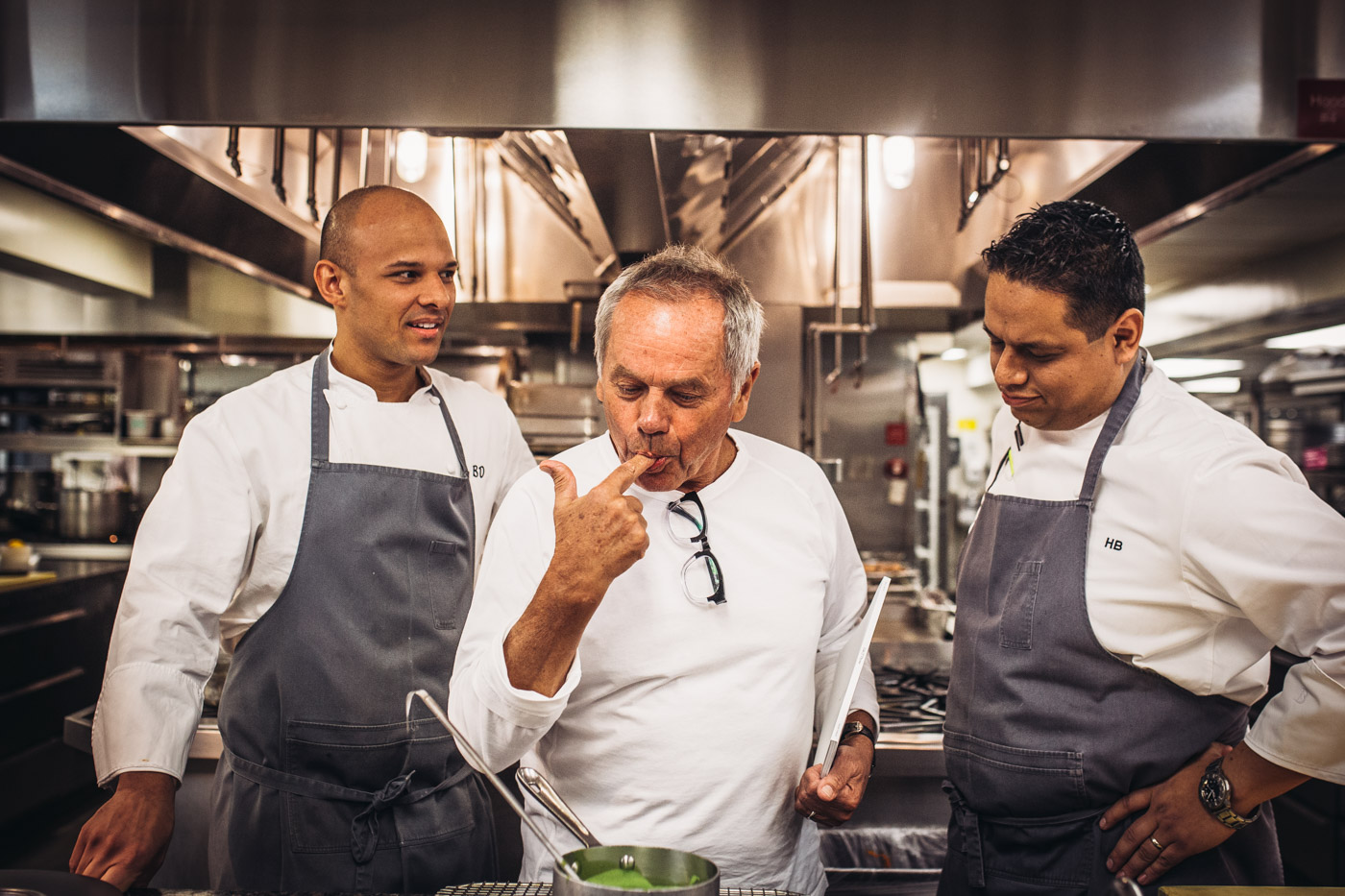





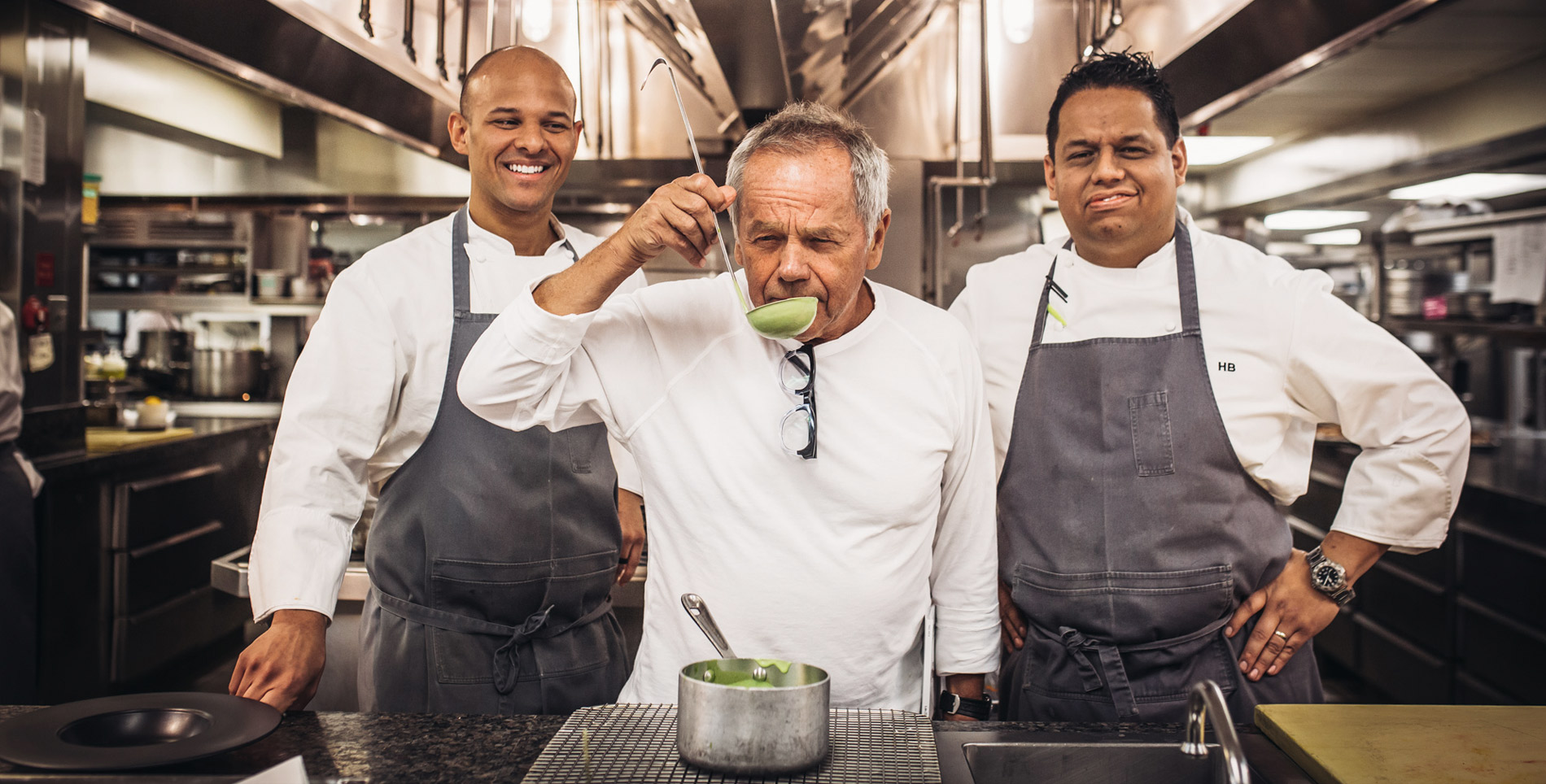

Our comments section is for members only.
Join today to gain exclusive access.